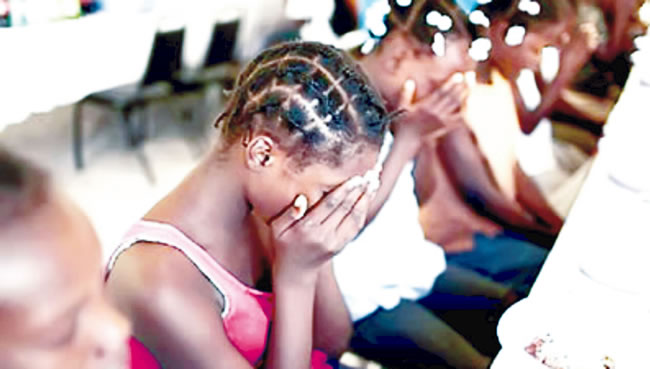ISAAC SHOBAYO highlights how poverty and insecurity are fuelling rising cases of child trafficking in Plateau State and the response of the state government to the menace.
The high prevalence of child trafficking in Plateau State in recent times has been a source of worry to the state government and other stakeholders. Given their age, the rate at which defenceless children are exploited for meagre pay, concerned stakeholders say, is both shocking and dehumanising. Residents of the state are somehow perplexed as to why the state has suddenly become the new epicentre for this repugnant and evil deed.

Recently, the syndicates behind the depraved act have discovered Plateau State as a location to find minors to be deployed for menial jobs such as house girls or house boys, and in some cases prostitution, in other parts of the country. They go as far as trafficking minors into neighbouring West African countries like Ghana, Ivory Coast, and Mali, among others.
Checks revealed that the syndicates often capitalise on the parents’ gullibility and financial difficulty to persuade them to release their children with the promise of a better life with paid jobs in cities around the country, especially in state capitals like Abuja, Lagos, Port Harcourt, and other major cities.
Worried by the development, the Governor Caleb Mutfwang-led administration recently established the Plateau State Gender and Equal Opportunities Commission and the Office of the Special Adviser to the Governor on Gender as part of the efforts to tackle the menace.
During his confession, an agent who was recently caught by the police revealed how he recruited minors and transported them out of the state: “There are many of us in this business, not just myself. We particularly target those who are unable to care for their children, and persuade them to release their children in exchange for training and menial jobs.”
Nigerian Tribune investigations revealed that a majority of these agents often pretend to be clergymen in order to use religion as a ruse to persuade parents to release their children.
It was also learnt that one way some of the unscrupulous agents dodge arrest is by placing the kids in expensive vehicles without supervision, with another agent waiting to receive them at their destination.
Recently, the police arrested one clergyman behind a major child-trafficking syndicate in the Plateau State, rescuing 13 children in the process. The clergyman (name withheld), who presided over a prayer ministry in the Jos South Local Government Area of the state was identified as the alleged leader of the trafficking ring, while his accomplices were equally nabbed.

During police questioning, the suspect reportedly confessed to trafficking at least 13 children, admitting to buying and selling them at varying prices. The syndicate was alleged to have targeted families in vulnerable situations, abducting children for illegal adoption or forced labour.
The rescued children have been placed under the care of child welfare services, while efforts are being made to reunite them with their families, officials said.
In a similar operation, the Plateau State Task Force on child trafficking last Saturday intercepted traffickers heading to Lagos State with under-aged children from Langtang South Local Government Area of the state.
The state Commissioner for Women Affairs, Mrs Caroline Panglang Dafur, said that the victims were rescued at the Lagos Park in Jos, adding that one suspect was arrested at the scene, while the rest were on the run.
She declared, “Underage Tarok children from Langtang South LGA were intercepted at a Lagos park in Jos, destined to be ‘way billed’ to Lagos to work for an unknown madam.
“A trafficker linked to the incident, Mrs. Manwor Ayuba, has been trailed and arrested by the state joint task force on trafficking following the interception of the children. Child labour and exploitation is a crime in the Plateau.”
Also, on December 2, 2024, acting on credible intelligence, a woman named Nanman Pungtel was arrested at Old Airport Junction, Jos, with three children she could not account for.
Nigerian Tribune findings indicated that the protracted security crisis in the state over the years is also a contributing factor. According to a community leader, Dalami Ibrahim, the crises have depleted the sources of livelihood of many people living in rural areas, the majority of whom are farmers. He added that most of the farmers sacked by the Fulani militias were forced to hibernate at the various internally displaced camps.
Ibrahim revealed that the majority of the displaced individuals are no longer able to care for their children which leaves them exposed to the tricks of human traffickers, some of whom pose as missionaries or clerics who are trying to help the parents with childcare.
“Many people’s sources of income have been exhausted by the state’s years of crises, particularly those who reside in the rural areas. Therefore, these unwanted individuals exploit this to entice the vulnerable children under the guise of helping them. Mining is another reason; crime, like prostitution by young girls, the majority of whom are underage, thrives near mining sites. These young girls occasionally eloped with foreign miners and then come back to enlist girls in the same behaviour.
A source close to the Ministry of Women Affairs disclosed that there is also local trafficking, that is, those underaged children picked up from the rural areas to do menial jobs in the state capital.
A 16-year-old girl, Joy who was recently rescued after spending nine months in Abuja disclosed that her traffickers told her parents of getting her a job and at the same time continuing her secondary education in Abuja, but ended up in one Madam’s house as house girl without salary. “Throughout the nine months, nothing was paid to me. But the trafficker who introduced me to them often comes around every month to collect a certain amount as salary on my behalf. This continued until I ran away and found my way back to our village in Bokkos through a Good Samaritan.”
However, stakeholders in Plateau State are seriously disturbed by the rising wave of child trafficking. Piqued by this ugly trend, Christian Women for Excellence and Empowerment in Nigerian Society (CWEENS) described the situation as alarming and in urgent need of resolution.
CWEENS National Coordinator, Professor Oluwafunmilayo Para-Mallam, said in December 2024 alone, CWEENS sheltered and provided psychological care for 17 trafficked children, including 13 rescued locally and four brought in from Mali and Ghana, adding that victims have since been reunited with their families through the Ministry of Women Affairs and Social Development.
She therefore advocated for stricter enforcement of anti-trafficking laws, harsher penalties for offenders, and enhanced collaboration between law enforcement, the judiciary and child protection agencies to ensure swift prosecution of traffickers and proper care for victims.
Professor Para-Mallam urged the government to address the root causes of trafficking, such as poverty and unemployment, by creating livelihood programmes for vulnerable families.
The state government through its Commissioner for Information and Communication, Mr Musa Ashom, who likened the situation to slavery, said the government was quite sad and disturbed by the ugly trend. Hence, it established an agency and fully empowered it to curb the menace.
Ashom said that apart from using the instrumentality of government to fight the menace, the state government is using the indigenes of the state residing in other parts of the country to curb the escalation of child trafficking, adding that the approach has started yielding positive results based on the reports received so far.
“They have been contacting us whenever they see underaged children from Plateau State perceived to have been trafficked out of the state or seen doing odd jobs instead of being in school. As a government, we are strongly against it, and we hope parents and guardians will collaborate with the government in this regard.
“The Ministry of Women Affairs and Social Development has recovered a lot of these children from different parts of Nigeria; some unscrupulous elements hide under the cover of religion or some cartels to perpetuate this evil act. They take advantage of their vulnerability or situation that happened and traffic these children and at some point even sell them off.
“The price for male child is about N350,000 and in some cases they sell as high as N750,000. There is no difference between this and slave trade. This is disheartening and excruciating painful. As a government, we are not going to relent, we are going to put up a mechanism that would curtail these cancerous behaviour, it has eaten deep into the fabric of our society,” he said
The commissioner for Information and Communication stated that the government has concluded arrangements to interface with community leaders, spiritual leaders and other stakeholders to help sensitise parents and guardians on the danger of child trafficking and the long-run consequences on the children and society in general.
Ashom said: “As a government our eyes are open and we shall do all we need to do to arrest the situation. It is a cartel; some people are making money out of it. Some come in the name of mission or evangelism and once they are able to get community trust, the children are handed over to them. It got to a point where they changed the children names and sometimes when you call a child with names given to him or her, she does not answer the name again. It is like they carried out brainwashing session for these kids.”
A source close to the Plateau State Gender and Equal Opportunities Commission revealed that some of those operating as cartels to traffic children have been charged to court while the Special Task Force established alongside has continued to hunt for those behind the evil act even beyond the state.
READ ALSO: Group cautions Wase, ex-Rep dep speaker against stoking crisis in Plateau







